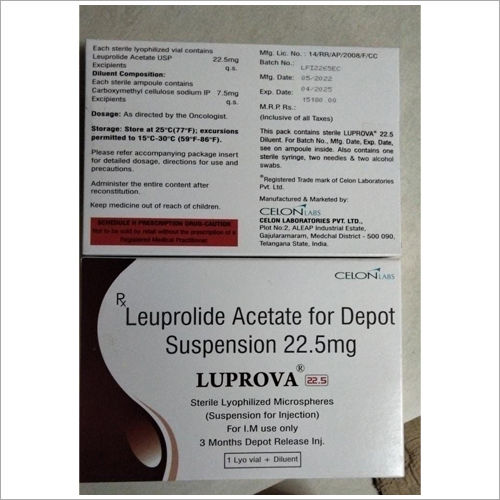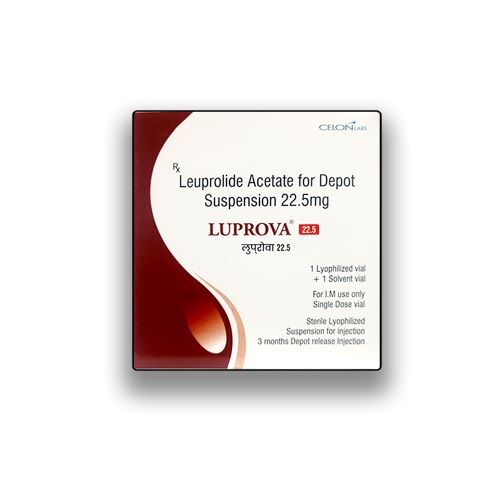Leuprolide Acetate for Depot Suspension
Product Details:
- Salt Composition Leuprolide Acetate
- Indication Cancer treatment
- Origin India
- Storage Instructions Cool and dry place
- Shelf Life 12 Months
- Click to View more
Leuprolide Acetate for Depot Suspension Price And Quantity
- 9500.0 INR/Vial
- 1 Number
Leuprolide Acetate for Depot Suspension Product Specifications
- Cancer treatment
- Leuprolide Acetate
- 12 Months
- India
- Cool and dry place
Leuprolide Acetate for Depot Suspension Trade Information
- Cash in Advance (CID), Cash Advance (CA)
- 1000 Number Per Month
- 2 Days
- No
- Australia, Central America, North America, Asia, South America, Eastern Europe, Western Europe, Middle East, Africa
- Kerala, Chandigarh, Dadra and Nagar Haveli, Maharashtra, Nagaland, Rajasthan, Sikkim, Tamil Nadu, Telangana, Tripura, All India, South India, Karnataka, Himachal Pradesh, Uttarakhand, West Bengal, Central India, West India, North India, East India, Gujarat, Lakshadweep, Mizoram, Meghalaya, Manipur, Andhra Pradesh, Bihar, Daman and Diu, Goa, Jharkhand, Odisha, Punjab, Assam, Delhi, Andaman and Nicobar Islands, Arunachal Pradesh, Chhattisgarh, Haryana, Jammu and Kashmir, Madhya Pradesh, Pondicherry, Uttar Pradesh
Product Description
Leuprolide acetate for depot suspension is a medication used in the treatment of various conditions, primarily hormone-related disorders. Here's an overview of its uses:
1. Prostate Cancer Leuprolide acetate is commonly prescribed for the treatment of advanced prostate cancer. It belongs to a class of medications known as gonadotropin-releasing hormone (GnRH) agonists. By continuously stimulating the GnRH receptors in the pituitary gland, leuprolide acetate suppresses the production of testosterone, which is known to fuel the growth of prostate cancer cells. This suppression of testosterone can help slow the progression of prostate cancer and alleviate symptoms associated with the disease.
2. Endometriosis Leuprolide acetate may also be used in the management of endometriosis, a condition where the tissue that normally lines the inside of the uterus grows outside of it. By suppressing estrogen production, leuprolide acetate can help alleviate the symptoms of endometriosis, such as pelvic pain and menstrual irregularities.
3. Uterine Fibroids In some cases, leuprolide acetate may be prescribed to treat uterine fibroids, which are noncancerous growths of the uterus. By reducing estrogen levels, leuprolide acetate can shrink the size of uterine fibroids and alleviate symptoms such as heavy menstrual bleeding and pelvic pain.
4. Precocious Puberty Leuprolide acetate may be used to treat precocious puberty, a condition where children begin puberty at an abnormally early age. By suppressing the production of sex hormones, leuprolide acetate can delay the onset of puberty and allow for more normal growth and development.
Leuprolide acetate for depot suspension is typically administered as an injection into the muscle (intramuscular injection) and is available in various strengths, including 22.5 mg. The frequency of administration and duration of treatment will vary depending on the specific condition being treated and the individual patient's response to therapy.
As with any medication, it's important to use leuprolide acetate under the guidance of a healthcare professional, who can determine the appropriate dosage and monitor for any potential side effects or complications. Common side effects may include hot flashes, decreased libido, erectile dysfunction, and bone density loss, among others.

Price:
- 50
- 100
- 200
- 250
- 500
- 1000+









 Contact Us
Contact Us Call Me Free
Call Me Free
